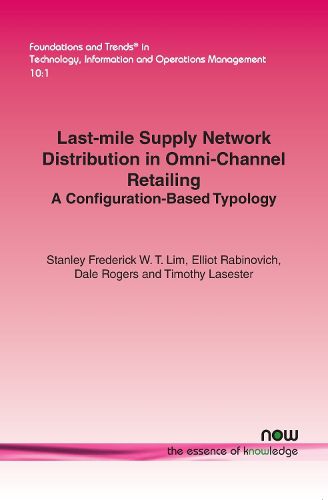Readings Newsletter
Become a Readings Member to make your shopping experience even easier.
Sign in or sign up for free!
You’re not far away from qualifying for FREE standard shipping within Australia
You’ve qualified for FREE standard shipping within Australia
The cart is loading…






This title is printed to order. This book may have been self-published. If so, we cannot guarantee the quality of the content. In the main most books will have gone through the editing process however some may not. We therefore suggest that you be aware of this before ordering this book. If in doubt check either the author or publisher’s details as we are unable to accept any returns unless they are faulty. Please contact us if you have any questions.
Omni-channel retailing (OCR) strategies have recently emerged as a powerful engine of growth in the retail industry. The goal is to provide consumers with a seamless and consistent shopping experience across different channels and devices. Success in implementing OCR strategies depends on sophisticated compromises between fulfilment responsiveness and product variety across different product types, consumer segments, and shopping occasions. Failures in OCR strategies to optimize the trade-offs between responsiveness and variety are rooted in a poor understanding of how OCR strategies should build on last-mile supply network (LMSN) distribution configurations.
This book addresses this issue by developing a typology of LMSN distribution configurations in OCR. Typologies are useful for four reasons:
(1) They provide a mechanism for incorporating holistic principles of inquiry into organizational research. (2) They explicitly define patterns of constructs that determine dependent variables while enabling researchers to move beyond traditional linear theories. (3) They provide a means to incorporate equifinality. (4) They establish connections between the findings of various studies.
The existing literature covers a number of last-mile typological systems in the supply chain. However, these typologies do not provide a satisfactory characterization of various forms of LMSN distribution configurations in OCR and their unique structure, product/order and information flow, service architecture, and relational and governance aspects.
To address these deficiencies in the literature, this typology updates the linearly chain-centric extended supply chain models developed previously and provides a framework that integrates multiple theoretical domains and terminologies that have been used disjointedly to describe the various forms of LMSN distribution configurations in OCR. After an introduction, Section 2 presents a review of the literature. Section 3 describes the methodology used to identify the different configuration dimensions and provides definitions of the terminologies. Section 4 describes the LMSN configuration-based typology while Section 5 presents LMSN evolution patterns through the discussion of example cases. Section 6 highlights key insights derived from the typology, elaborates on academic implications, and suggests some research extensions. Section 7 discusses the managerial implications and concludes.
$9.00 standard shipping within Australia
FREE standard shipping within Australia for orders over $100.00
Express & International shipping calculated at checkout
This title is printed to order. This book may have been self-published. If so, we cannot guarantee the quality of the content. In the main most books will have gone through the editing process however some may not. We therefore suggest that you be aware of this before ordering this book. If in doubt check either the author or publisher’s details as we are unable to accept any returns unless they are faulty. Please contact us if you have any questions.
Omni-channel retailing (OCR) strategies have recently emerged as a powerful engine of growth in the retail industry. The goal is to provide consumers with a seamless and consistent shopping experience across different channels and devices. Success in implementing OCR strategies depends on sophisticated compromises between fulfilment responsiveness and product variety across different product types, consumer segments, and shopping occasions. Failures in OCR strategies to optimize the trade-offs between responsiveness and variety are rooted in a poor understanding of how OCR strategies should build on last-mile supply network (LMSN) distribution configurations.
This book addresses this issue by developing a typology of LMSN distribution configurations in OCR. Typologies are useful for four reasons:
(1) They provide a mechanism for incorporating holistic principles of inquiry into organizational research. (2) They explicitly define patterns of constructs that determine dependent variables while enabling researchers to move beyond traditional linear theories. (3) They provide a means to incorporate equifinality. (4) They establish connections between the findings of various studies.
The existing literature covers a number of last-mile typological systems in the supply chain. However, these typologies do not provide a satisfactory characterization of various forms of LMSN distribution configurations in OCR and their unique structure, product/order and information flow, service architecture, and relational and governance aspects.
To address these deficiencies in the literature, this typology updates the linearly chain-centric extended supply chain models developed previously and provides a framework that integrates multiple theoretical domains and terminologies that have been used disjointedly to describe the various forms of LMSN distribution configurations in OCR. After an introduction, Section 2 presents a review of the literature. Section 3 describes the methodology used to identify the different configuration dimensions and provides definitions of the terminologies. Section 4 describes the LMSN configuration-based typology while Section 5 presents LMSN evolution patterns through the discussion of example cases. Section 6 highlights key insights derived from the typology, elaborates on academic implications, and suggests some research extensions. Section 7 discusses the managerial implications and concludes.